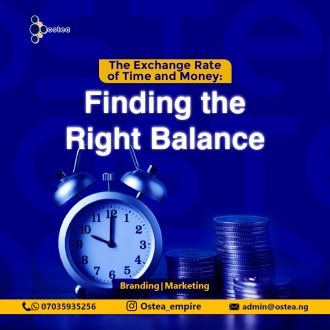
Time and money are two of the most important resources we manage in our daily lives. While
they are often intertwined, their true value depends on how we use them. Trading time for
money and vice versa is a delicate balance, and understanding this relationship can help us
make better decisions that lead to more fulfilling lives.
In this blog, we’ll explore the concept of the time-money exchange rate, the importance of
finding balance, and strategies for using both resources more effectively.
The idea of trading time for money is most obvious in the workplace, where we exchange hours
of labor for a paycheck. For many people, this is a straightforward calculation—work more
hours, earn more money. However, the value of time is far more complex. While money can be
saved, earned, and invested, time is finite. Once it’s gone, it can’t be reclaimed.
This makes time one of life’s most valuable assets, and every hour we spend comes with an
opportunity cost. When we choose to work overtime, we sacrifice time with loved ones or rest,
and when we take time off, we forgo potential earnings. The key to managing the time-money
trade-off is understanding which resource is more valuable in a given situation.
One of the most powerful ways to maximize your time is by using money to buy it back. This
often means outsourcing tasks that are time-consuming but not particularly valuable to you
personally. For example, you could hire a cleaner to take care of household chores, freeing up
time to spend with family or focus on a side project.
Here are a few examples of how people use money to buy time:
Opportunity cost refers to the benefits you miss out on when choosing one alternative over
another. When it comes to time, this means recognizing what you could be doing instead of your
current activity.
For example, if you spend hours each week doing chores that could be outsourced, the
opportunity cost might be time you could have spent on work, personal development, or
relaxation. Understanding this cost helps you make better decisions about how to spend your
time.
Whether you’re trading time for money or using money to save time, time management is
essential to getting the most out of both. Here are some effective strategies:
To understand your personal time-money exchange rate, you can start by calculating your
hourly rate—how much money you earn per hour of work. This gives you a baseline for
evaluating whether it’s worth trading time for money in certain situations.
For example, if you earn $50 per hour at your job and it costs $25 to outsource a task,
outsourcing may be a better use of your resources. On the flip side, if your time is worth more in
terms of rest, personal development, or relationships, spending that extra hour working may not
be worth the money earned.
Ultimately, many people aim for financial independence—the point at which they no longer need
to trade time for money. Achieving financial independence allows for complete control over how
you spend your time, whether it’s on passion projects, hobbies, or simply enjoying life without
financial pressure.
While reaching financial independence requires careful planning and often years of disciplined
saving and investing, it also requires a shift in mindset. It’s not just about accumulating wealth;
it’s about understanding how to best use both time and money in the present to create a life that
is meaningful and fulfilling.
The relationship between time and money is one of life’s most important trade-offs, and
understanding it helps us make smarter decisions about how we allocate our resources. The
key to maximizing the exchange rate between time and money is balance—knowing when to
prioritize financial gain and when to prioritize personal freedom.
By making thoughtful choices about how you spend both your time and money, you can live a
life that is not only financially secure but also rich in experiences, relationships, and personal
satisfaction. After all, while money is important, time is the true currency of life.